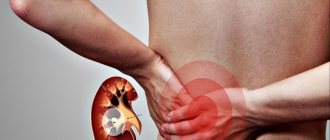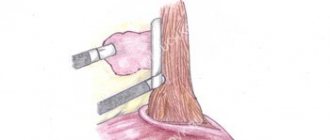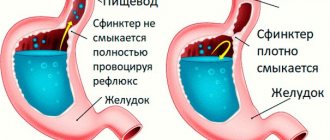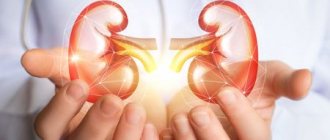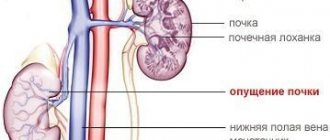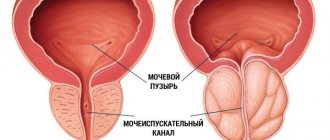Our kidneys are the body's natural filter. Kidney diseases must be treated promptly and adequately, because they not only reduce the quality of life, but are also potentially dangerous for the condition of the body as a whole.
In addition to filtration, the kidneys perform other important functions for our body: they regulate the pH balance, maintain normal blood pressure, and participate in the production of blood cells. A person can live with one kidney, but if both organs fail, death is likely.
Kidney tissue is extremely vulnerable to pathogenic microorganisms. The kidneys quickly become inflamed due to hypothermia, infection from the genitourinary tract, or diseases of the gastrointestinal tract. Qualified urologists at the SANMEDEXPERT clinic encourage you to seek help at the first alarming signs of renal pathologies, as this guarantees a sustainable result of their therapy.
Common kidney diseases
Below is a list of the most common kidney problems in people of different genders and ages:
- Urolithiasis is a polyetiological disease that can develop due to the consumption of hard tap water with a high concentration of mineral salts. Also included in the list of causes of this disorder are endocrine disorders, metabolic dysfunctions, and infectious pathologies of the genitourinary system. Urolithiasis can occur due to long-term use of certain medications. It is characterized by the accumulation of heterogeneous stones in the renal calyces, pelvis and ureters.
- Pyelonephritis is a rather severe infectious and inflammatory disease of the kidneys, which can be either acute or chronic. It occurs against the background of psycho-emotional overload, disruption of the immune system, poor nutrition, and increased physical activity. The risk of its development increases with diabetes mellitus and chronic inflammatory diseases. Pyelonephritis is quite difficult to treat and tends to recur.
- Nephroptosis - this pathology is characterized by abnormal mobility of organs. It is also called "prolapse of the kidneys." In this case, the blood circulation process is quite often disrupted. Catalysts for the development of such processes can be heavy physical labor, rapid and unhealthy weight loss, and various mechanical injuries.
- Glomerulonephritis is an acute or chronic inflammatory process in the renal glomeruli, which occurs against the background of pharyngitis, pneumonia or erysipelas of the skin. Less often - with related tuberculosis or malaria. In addition to the renal glomeruli, the tubules may be affected. Treatment for this disease is long-term and can last for several years.
- Hydronephrosis - this pathology develops against the background of impaired outflow of urine from the kidneys. As a result, abnormal expansion of the renal calyces and pelvis occurs. Typically, the causes of this process are protracted diseases of the pelvic organs, individual characteristics of the anatomical structure of the organs, kidney tumors and stones in the ureters, narrowing their lumens.
- Kidney failure - this pathology is the most serious of all listed. With its development, the kidneys completely or partially cease to function. This results in stagnation of uric acid and urea in the body, which causes severe damage to overall health. Very often, kidney failure develops due to ignoring milder diseases of this organ. It can also appear due to gout, diabetes, various intoxications (poisons and aggressive medications). Pyelonephritis and glomerulonephritis, without adequate treatment, almost always develop into renal failure.
Any kidney disease must be treated promptly, and our highly qualified urologists will help you with this. We urge you not to ignore the first warning signs without proper attention and contact specialists as early as possible.
DAY CARE SERVICE
17th century diet
-What are these rules?
– Firstly, in order to keep your kidneys healthy, you need to eat right. The most healthy diet is the diet of the 17th century, when even salt was difficult to obtain, so people ate only fresh foods. In the production of fast food and shelf-stable products, a huge number of different reagents are used, which must undergo decontamination in the human body. And in order to destroy them and make them safe, the kidneys must work to the limit of their capabilities. Secondly, you need to be careful when taking antibiotics, analgesics and antiviral drugs. These rules need to be known not only to patients of nephrologists, but also to people at risk.
Click to enlarge
- Who is included in it?
– These are patients with arterial hypertension, diabetes mellitus, atherosclerosis, and chronic diseases that require painkillers. Among them there are especially many patients with pathologies of the musculoskeletal system. People at risk include people who were born with low body weight (particularly premature babies), and those who abuse nutritional supplements and follow diets with a high protein load.
Article on the topic
A capricious couple. Which kidney diseases are deadly and how to avoid them
Basic diagnostic methods
To differentiate true pathology, specialists at the SANMEDEXPERT clinic use advanced diagnostic methods using high-tech equipment and high-quality instruments.
First of all, our urologist will carefully study your medical history (in particular, family history), determine your genetic predisposition to the development of pathologies, and evaluate the nature of your lifestyle and diet. Next, physical examinations will be performed. If a specific disease is suspected, the specialist will begin an in-depth examination.
Recommended examinations for suspected kidney disease:
- Laboratory tests (blood / urine tests for the concentration of creatinine, urea, total protein, albumin, potassium, sodium, chlorine, inorganic phosphorus, as well as general and biochemical blood / urine tests);
- Laboratory tests (according to Nechiporenko / bacteriological studies);
- Instrumental methods (ultrasound, CT, MRI, excretory urography, biopsy, radioisotope renography, scintigraphy, radiography, endoscopy, ultrasound, radionuclide methods).
You may also need to consult an endocrinologist and therapist. Once the diagnosis is finally approved, the specialists of the SANMEDEXPERT clinic prescribe effective treatment.
Acute pyelonephritis (kidney inflammation)
is a rapidly developing and life-threatening disease. It is characterized by increasing serous-purulent inflammation in the kidney, leading to severe intoxication (poisoning of the body with infectious and other toxins).
In this case, the patient most often complains of pain in the lumbar region (“impossible to touch”), fever (up to 39 degrees with chills), severe general weakness, headache, nausea, vomiting, dry mouth, bloating. In the absence of adequate treatment for kidney inflammation, a picture of infectious-toxic shock may develop: a drop in blood pressure, loss of consciousness, tachycardia, pallor of the skin.
The main distinguishing feature of acute kidney inflammation is the possibility of rapid progression with a fatal outcome. The reason for this is the peculiarities of the blood supply. 20-25 percent of the circulating blood “passes” through the kidneys, so in a situation where the kidney turns into, in fact, an abscess, there is a danger of generalization of inflammation (spread to the entire body).
Causes of acute pyelonephritis
– an infectious process in the kidney caused by bacteria. Pathogens (usually Escherichia coli - E.Coli) can enter the organ in two main ways: from the lower urinary tract (for example, from the bladder in chronic cystitis) and from the blood (for example, if there is a focus of infection somewhere - caries, tonsillitis, sinusitis, etc.). However, out of the blue, pyelonephritis (inflammation of the kidneys) develops extremely rarely. Most often, there are so-called “predisposing factors”: urolithiasis, abnormal development of the genitourinary organs, the presence of narrowing of the ureters, prostate adenoma, etc.
If acute pyelonephritis is suspected, the patient must be immediately hospitalized in a specialized clinic.
Main treatment methods in our clinic
Our specialists use the following kidney treatment options:
- Medication (therapeutic and restorative, including the use of anti-inflammatory and antibacterial drugs, multivitamin complexes, diuretics, erythropoietins, hormones, quinolones, antiplatelet agents, etc.);
- Conservative (wearing an individual bandage, physiotherapeutic methods, physical therapy, diet therapy, etc.);
- Surgical (nephropexy, stone crushing using abdominal surgery, laser therapy, extracorporeal lithotripsy, laparoscopy, pyelolithotripsy; organ transplantation, etc.).
In some cases, we use intensive blood purification methods - hemodialysis and peritoneal dialysis.
We guarantee you a favorable prognosis even if complex and lengthy treatment is required.
Drugs against kidney stones
Tablets for the kidneys, which dissolve and remove stones for urolithiasis (nephrolithiasis, urolithiasis), are not the same. The choice of product depends on the type of stones, which can be urate, oxalate, phosphate and others. After tests, ultrasound, and radiography, the patient will be offered the following medications:
- Allopurinol, the active substance is allopurinol. Disturbs the synthesis of uric acid, suitable for dissolving urates. When taken, it increases the excretion of urates in the urine and prevents salts from depositing in the kidneys. It can also be used in complex therapy of calcium oxalate nephrolithiasis.
- Blemaren, active substances sodium citrate, potassium bicarbonate. Dissolves urates, prevents the formation of calcium oxalate stones. Produced in the form of effervescent tablets.
- Xidifon, active substance etidronic acid. It works against phosphorus and calcium stones, and is also indicated for certain types of nephritis.
- Tiopronin and Penicillamine. Medicines can be used to treat all types of nephrolithiasis.
Also effective drugs for treating kidney stones are Litostat, Potassium citrate, Biliurin, Urodan. The duration of treatment can be 3-12 months.
Diagnostics
Diagnosis of diseases of the urinary system begins with taking an anamnesis. After this, a doctor’s examination is carried out, which includes palpation of the kidneys (palpation) - normally they should not be palpated; percussion of the kidneys (tapping the corresponding part of the body), palpation of the bladder area, examination of the external genitalia.
Among the instrumental examination methods:
- Blood analysis. Aimed at detecting increases in blood urea, creatinine and uric acid.
- Urinalysis (general and Nechiporenko). Determines the presence of impurities, markers of inflammation, and inadequate function of the kidney filtration barrier.
- Ultrasound, X-ray, CT, MRI. Changes in the size and shape of the kidneys, the presence of neoplasms (tumors and cysts) are determined, and the presence of stones due to urolithiasis is detected.
conclusions
The kidneys are an important organ that is responsible for the composition of the blood, the production of hormones and cleansing the body. When overloaded, toxins begin to accumulate in the kidneys, which negatively affects health. It is necessary to maintain kidney health and stimulate waste elimination. At the same time, you must clearly understand that serious ailments require professional treatment from a urologist!
ONLINE REGISTRATION at the DIANA clinic
You can sign up by calling the toll-free phone number 8-800-707-15-60 or filling out the contact form. In this case, we will contact you ourselves.
Healthy eating for healthy kidneys
Due to minor failures in the kidneys, waste and toxins are retained in the body. And when the filter system becomes clogged, the kidneys become more susceptible to disease. Therefore, for any problems with the kidneys, it is important to review the diet.
For example, it is important:
– at least temporarily exclude smoked meats, canned food, and fried foods from the menu;
– replace salt with light spices, such as cumin (salt retains fluid in the body);
– if painful symptoms are often disturbing – limit the intake of proteins, that is, eggs, fish, and do carbohydrate fasting days (the necessary carbohydrates are contained in oatmeal, fruits, vegetables and berries, the kidneys will be “unloaded” thanks to the watermelon menu, fresh juices, vegetable salads with vegetable oil);
– maintain high-calorie nutrition so that the body does not consume protein reserves (you can include honey, jam, pasta dishes in your diet);
– give up alcoholic drinks, coffee, carbonated waters and mineral water with sodium so that the therapeutic diet is effective.
Diuretics for kidney treatment
Diuretics, or diuretics, are indicated for almost all pathologies of the urinary system. Without increasing the amount of urine excreted, it is impossible to get rid of pyelonephritis, glomerulonephritis, and urolithiasis.
Even with renal failure and atrophic processes, these medications are prescribed to prevent inflammation.
The most famous remedies:
- Lasix;
- Furosemide;
- Torasemide;
- Hydrochlorothiazide;
- Mannitol.
If a person has to take diuretics for a long time, one should opt for potassium-sparing diuretics, which will help preserve vital salts in the body. This is Veroshpiron, Aldakton. A number of diuretics (mercury, with ammonium chloride, Theophylline) are strictly prohibited for kidney pathologies.
When there is a sharp stagnation of fluid, severe swelling, the person is given Furosemide - it has a powerful but short-term effect. In mild cases, it is preferable to choose a herbal medicine - infusions with birch buds, corn silk, bearberry, lingonberry leaves.
Prevention
The most universal and simple way to prevent the formation of kidney stones is to reduce the concentration of urine. Therefore, if you have urolithiasis, you need to drink more. In most cases, you need to drink enough to excrete about 2.5 liters of fluid per day in your urine. However, these recommendations are not suitable for people with cardiovascular disease in whom fluid restriction is indicated.
Article on the topic
Tricks of hemodialysis. When to go for renal replacement therapy
Diuretic herbs, rosehip decoction and apple compote are useful.
See also: Herbs for the kidneys →
The water must be boiled and filtered through household filters. Try to choose cartridges that soften water. It is not advisable to drink mineral water. It contains calcium and magnesium, which can later form stones.
A light and fairly varied diet is recommended. Dietary restrictions depend on the composition of the stones.
See: Diet number 7 for the kidneys →
When identifying oxalate stones and mixed stones, you need to limit foods high in calcium and oxalic acid in your diet. Eliminate rhubarb, legumes, sorrel, lettuce, spinach and other green vegetables. It is undesirable to eat raspberries, cheese, chocolate, and nuts. Minimize your consumption of currants, radishes, radishes and citrus fruits. It is undesirable to drink strong tea, coffee and cocoa. Some limitation of table salt and animal fats is also necessary. Products containing fiber are beneficial, such as wholemeal bread and bran.
If urate stones are identified, you need to limit foods that are sources of uric acid formation in the body. These include meat broths, poultry, fish, sausages, and spicy cheese. Strong tea, coffee, chocolate, and cocoa are also contraindicated. You need to eat less fried and stewed meat, jellied meat, offal (liver, liver, etc.). It is recommended to limit alcohol consumption as much as possible, especially red wines and cognac.
Article on the topic
Pioneers of transplantation: the history of the first kidney transplants
If you identify stones that contain phosphates, you should eat less dairy products, fish and eggs.
If you experience discomfort in the lumbar region, you should contact a urologist.
Antispasmodics
Drugs in this group are indispensable for renal colic. The latter can occur both during an acute inflammatory process and when a stone moves through the ureter. Due to irritation of the nerve endings, smooth muscles spasm, resulting in increased pain. Taking an antispasmodic relaxes the urinary tract, urine flow is restored, small stones leave the body, and the pain goes away.
There are different types of antispasmodics that can be used for kidney diseases:
- Neurotropic drugs (with central action). They block the transmission of pain signals to muscle cells, as a result the fibers stop spasmodic contraction. Particularly popular are M-anticholinergic drugs - Atropine, Platiphylline, Metacin, Gomatropine.
- Myotropic drugs. They work at the local level, act directly on the muscles of the ureters and bladder, helping them relax. This group includes well-known drugs - No-shpa, Drotoverine, Mebeverine, Papaverine.
Usually, with renal colic, a person takes two tablets of No-shpa, because this medicine is most often offered in pharmacies for a similar problem. If the pain is severe and unbearable, it is better to inject No-shpa - the lumen of the ureter will quickly expand, the risk of obstruction will decrease, as will the pain syndrome.
Common symptoms of kidney and urinary tract diseases
When faced with symptoms that indicate disturbances in the functioning of the urinary system, you need to consult a urologist as soon as possible. There are some common manifestations of pathologies:
- urinary disorders (frequency and/or quality),
- changes in urine color
- blood in urine
- pain and burning when urinating,
- pain in the lower back and stomach,
- increased body temperature and blood pressure,
- general weakness, drowsiness, headache,
- the appearance of swelling of the limbs and face due to impaired removal of fluid from the body,
- loss of appetite, bad taste in the mouth and bad breath.
Kidney disease also affects a person’s appearance. A specific characteristic is the appearance of dark circles and puffiness under the eyes, pallor, yellowing and dry skin.
